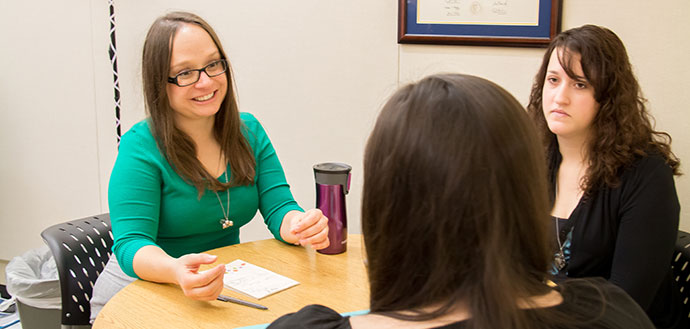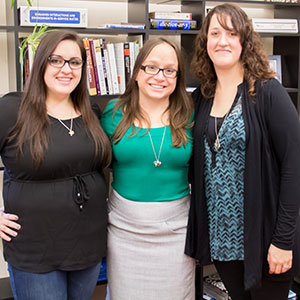
College of Public Health and Human Sciences Assistant Professor Bridget Hatfield came to Oregon State in 2013 after serving as a postdoctoral research associate at the University of Virginia, Center for Advanced Study of Teaching and Learning. She earned a master’s degree in Child and Family Studies from the University of Tennessee and a PhD in Human Development and Family Studies at the University of North Carolina at Greensboro.
What does your current research entail?
“My research focuses on interactions between adults and children and how those interactions support children’s behavior and emotion regulation as well as activity in the stress response system. Currently, I am conducting three research projects. The first investigates mother-child interactions, child behavior and mother activity in the stress response system before and after a parenting education series. The second, still in its preliminary stages, will investigate how teacher-child interactions and classroom quality are associated with the teacher-child relationship, child behaviors and children’s activity in the stress response system. Finally, I am investigating parent-child interactions of children in a motor play and free play setting.”
What sparked your interest in this topic?
“After graduation, I taught 2-year olds and was able to see developmental differences in a context experienced by many of our young children. I was fascinated with the peer relationships, their behavior and how interactions with my teaching team and I helped to shape their responses and understanding of the world. I realized that children spent an average of eight hours a day, five days a week with me, and that as early childhood educators we had a responsibility to afford children the most enriching, responsive and supportive environment to help them thrive.”
How will this make a difference?
“It is my hope that this research be translated for early care and education practitioners and parents, is useful for the field and helps us to identify the essential components of adult-child interactions that best support young children’s behavior, emotion regulation and activity in the stress response system.”

What would you say is the most fascinating aspect of this research?
“The children never cease to amaze, surprise and fascinate you. Also, that early care and education teachers are so underappreciated and underpaid. Next time you see your child’s teacher, say, ‘Thank you!’”
Are you working with anyone else in the CPHHS on this project?
“On the parenting education research project I’m collaborating with Assistant Professor John Geldhof and Parenting Education Program Coordinator Denise Rennekamp. I am also collaborating with Assistant Professor Megan MacDonald on the parent-child interactions of children in a motor play and free play setting.”
Why is research important in the field of human development and family sciences?
“It helps us to better understand characteristics of the contexts that children occupy. If we can understand those essential components of interactions, we can translate them to resources such as parenting education classes, college courses and teachers’ professional development. These things will help best support healthy children and families.”
What’s next for you? Do you have any future research projects lined up?
“I’m a co-investigator on three Institute of Education Sciences grants that we submitted in August, so hopefully something works out. Fingers crossed.”
What is the best advice you’ve ever received?
“Remember to take care of yourself and create a work-life balance. And, that your best is variable. For example, my Kentucky Wildcats do not win every national title, but they nearly always do their best.”
What advice would you give to current students and recent alums?
“Find a topic that you are fascinated with and continue to learn. Don’t be afraid to challenge yourself – push your strengths. Be willing to receive feedback and use it to improve your skills. Seek out new opportunities and get to know your professors.”
What are your favorite activities outside of work?
“Sleeping. And other things like working in the garden, hiking, traveling, cooking and enjoying Oregon wineries and the coast. Also, since my move to Oregon last fall, finding sunshine in these winter months.”

